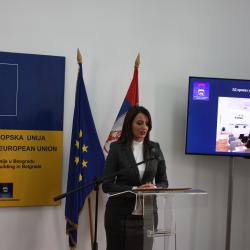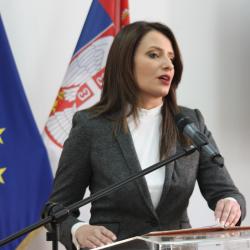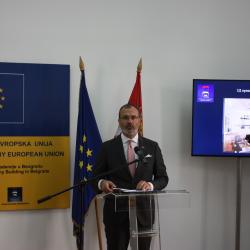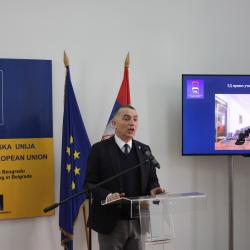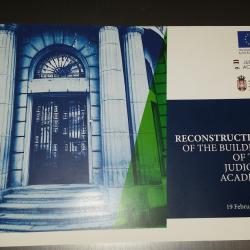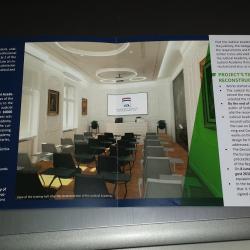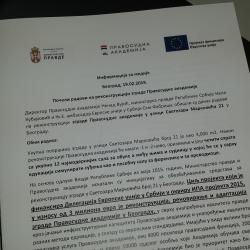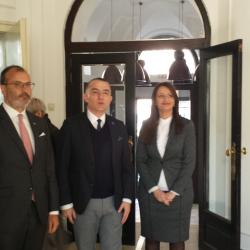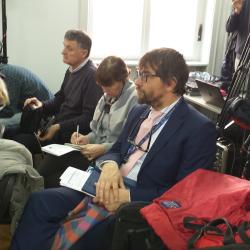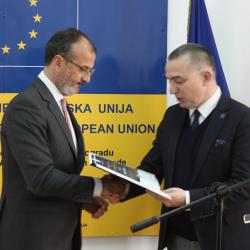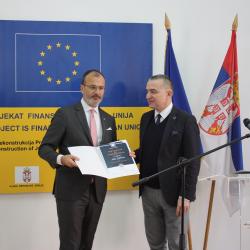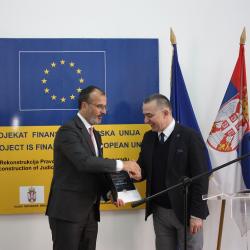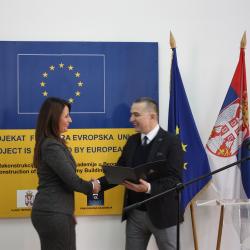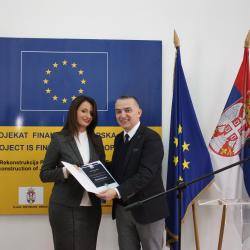Works on the reconstruction of the Judicial Academy building have begun - a report from a press conference
Gallery of photos from the press conference in the building of the Judicial Academy on 19 February 2019 - Source: Judicial Academy
The Minister of Justice, Mrs. Nela Kuburović stated, at the commencement of the work on the reconstruction of the building of the Judicial Academy, that she expects that its formal opening will take place within a year and that, up to then, the constitutional amendments will be passed in the area of the judiciary.
"By that time, I expect that new laws concerning the status of judges and prosecutors will be passed as well as that the Judicial Academy will become a constitutional category", said Mrs. Kuburović, and expressed her gratitude to the European Union for the assistance in the reconstruction of the building of the Judicial Academy.
As the Minister Mrs. Kuburović put it, the Judicial Academy was also recognized by the Venice Commission as a very important institution for the independence of judges, as well as for their accountability and efficiency. She said that the Judicial Academy has justified its existence and that, today, in addition to being in charge of the training of judicial office holders, it is also in charge of the training of public bailiffs and notaries.
Statements for the media on the occasion of the commencement of the work on the reconstruction of the building of the Judicial Academy - Source: Video production of the Judicial Academy
As stated at the ceremony, by virtue of the decision of the Government of Serbia in 2015, the Ministry of Justice and the Judicial Academy launched an initiative for the provision of the funds for the reconstruction of the building.
The Head of the EU Mission to Serbia, H.E. Mr. Sem Fabrizi said that the Mission, together with the Government of Serbia, is working on the "full establishment of the rule of law" in Serbia in the course of the process of its accession to the EU.
To use his words, in the process, the key Chapters are those on the judiciary and human rights, the issues covered by Chapters 23 and 24, which are indispensible for democratic life. Every state needs professional, independent, and educated judges, Mr. Fabrizi pointed out.
The Director of the Judicial Academy, Mr. Nenad Vujić presented to the Minister Mrs. Kuburović and to Mr. Fabrizi the certificates of merit for their endeavours on the development of the Judicial Academy, the reconstructed building of which, he believes, will be opened in the beginning of the next year.
Mr. Nenad Vujić briefly informed those present about the project, the history of the Academy, as well as about the volume of the work and, in particular, about the mission and vision of the Academy in the light of the reconstruction of the building, which, as he put it, is yet to give its full contribution to the improvement of the judicial system of the Republic of Serbia.
Volume of the work:
The total floor area of the building at #21, Svetozara Markovića Street is around 3,000 m2. After the reconstruction, the Judicial Academy will have -1 and -2 levels, the ground floor plus four storeys with a total of 12 state-of-the-art training halls and among them a courtroom as well, in which, for education purposes, trials will be simulated, as well as a special hall for forensics and facilities for translators.
Based on the decision of the Government of the Republic of Serbia of May 2015, the Ministry of Justice and the Judicial Academy launched the initiative for the provision of the funds for the reconstruction of the building at #21, Svetozara Markovića Street in Belgrade.
The objective of the project, which is financed by the Delegation of the European Union to Serbia within the IPA 2015 project, to the amount of 3 million Euros, is the reconstruction, refurbishment, and remodelling of the building of the Judicial Academy in Belgrade, aimed at the improving of the quality of justice through the strengthening of the infrastructure capacities of the Judicial Academy and enhancing of the quality various methods of education, in line with the European standards.
Bearing in mind a great number of beneficiaries of the services of the Judicial Academy, around 4000 judicial office holders, 2000 judicial assistants, and over 10000 members of court staff whom the Academy trains each year, the long-term solving of the issue of the space of the Academy was the priority in order to put the Academy in the working order so as to be able to exercise its powers prescribed by the Law on Judicial Academy, as well as by the National Judicial Reform Strategy and the Action Plan for Chapter 23.
The current temporary spatial capacities of the Academy are the limiting factor in the provision of training courses, which prevent the Academy from meeting its obligation to organize and provide training programmes for new judicial professions (notaries, mediators, public bailiffs, etc.). The main agents of the project are the Delegation of the European Union to Serbia and the Ministry of Justice of the Republic of Serbia.
Gallery of 3D presentations of classrooms, the library, and the courtroom after the reconstruction of the building of the Judicial Academy - Source: Judicial Academy
The project schedule and milestones in the project of the reconstruction:
- The work commenced on 1 February 2019
- The Judicial Academy had previously prepared the necessary design documentation and procured the required permits/approvals, after which the EU conducted the tender procedure and selected the contractor and the construction supervision
- By the end of 2015, the IPA 2015 Project was signed between the Government of the Republic of Serbia and the European Commission on the financing of the Project including, inter alia, the reconstruction of the building
- The Judicial Academy initiated the procedure for the preparation of the conceptual design of the reconstruction, for the purpose of procurement of the required permits / approvals in compliance with the Law on Planning and Construction. On 22 December 2016, the Secretariat for Urban Planning and Construction of the City of Belgrade issued the building permit. After obtaining the building permit, the elaboration of the conceptual design was proceeded with including the description of the work on the reconstruction.
- The decision and the above mentioned documentation were handed over to the Delegation of the European Union on 7 May 2017. The EU Delegation to Serbia engaged an expert person for the preparation of the tender documents, in line with the laws of the Republic of Serbia and the EU procedures.
- On 8 June 2018, the EU Delegation, on the official EU Website, posted the tender and, on 8 August 2018, initiated the procedure of the selection of the contractor for the building of the Judicial Academy, at #21, Svetozara Markovića Street, in Belgrade.
- In the beginning of November 2018, the EU Delegation to Serbia notified the Judicial Academy that it had selected the contractor and, on 14 December 2018, that the contract had been signed with the contractor to the amount of EUR 2,789,854.81.
- On 14 January 2019, the EU Delegation to Serbia notified the Judicial Academy that the work on the reconstruction of the building would officially start on 1 February 2019, as well as that, in line with the Contract, the deadline for the completion of the work is 12 months.
- The completion of the work on the reconstruction of the building – February 2020.
Importance of the project:
Due to the importance of and obligations that the Judicial Academy has in Chapter 23, particularly in the part that is related to the competence of the judiciary, the European Union Delegation to Serbia accepted the initiative and in line with the requirements and the Feasibility Study, gave its consent to finance it, using the IPA 2015 Project funds, with three million Euros. The funds are channelled to the reconstruction and equipping of the building of the Judicial Academy, at #21, Svetozara Markovića Street, in Belgrade. Even up to now, the EU Delegation had supported the Judicial Academy through numerous projects (the EU law is included in the regular training curricula of the Academy) and also, as the result of it, the Judicial Academy has become a modern and functional institution.
Key objectives of the reconstruction project:
- In the reconstructed space, the Judicial Academy should, in cooperation with the other relevant subjects (the High Judicial Council and the State Prosecutorial Council), administer entrance examinations and provide training courses
- The adequate space of the Academy should provide it the opportunity to respond to all the training requirements and to a great number of examinations that are within the remit of the Academy
- The reconstructed premises, with respect to the spaciousness, the number of rooms, and the provided equipment, are the prerequisite for the provision of the continuous and proper quality training (forensics, cyber crime, etc.)
- The forthcoming reconstruction should take into consideration the status of the building in question, its characteristics, e.g. it will be necessary to completely transform the purpose and functions in the selected building (from a court into the training institution) so as to ensure that the interventions made do not excessively change the appearance within the setting and the characteristics of the building. Therefore, it is necessary to ensure the restoration and preservation of the existing building (the windows, footways, and decorations must be preserved as much as possible)
- The new space should contribute to a more efficient functioning of the Judicial Academy. Additionally, the EU has also provided funds for the new ICT equipment in line with the technical specification and the requirements for the development of the Documentation and Information Centre (the DIC), which will include numerous databases, incorporating the data for the entrance examination of the beneficiaries of the initial training, the examinations for the judicial and prosecutorial interns, records of training beneficiaries, mentors, and lecturers, the databse of the case law and other databases and registers to be formed for the purpose of improvement of the operation of the Judicial Academy.
The new building will enable efficient functioning of the Judicial Academy, i.e. exercising of its powers to the full capacity, particularly when we talk about the initial and continuous training of judges and prosecutors and those employed in the judiciary, as well as about judicial professions.
Attachments:
- Brochure
Media reports:
RTS
RTV Vojvodina
Danas
Kurir
N1
Vesti
Таnjug
Novi magazin
Burina.net
ТV Most
Happy TV

